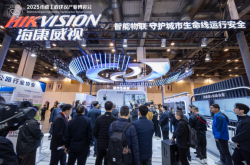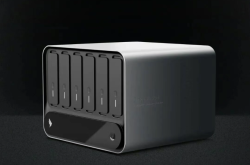Lei Jun Unleashes Xiaomi's Redemption Campaign After 50 Days of Silence
![]() 05/25 2025
05/25 2025
![]() 678
678
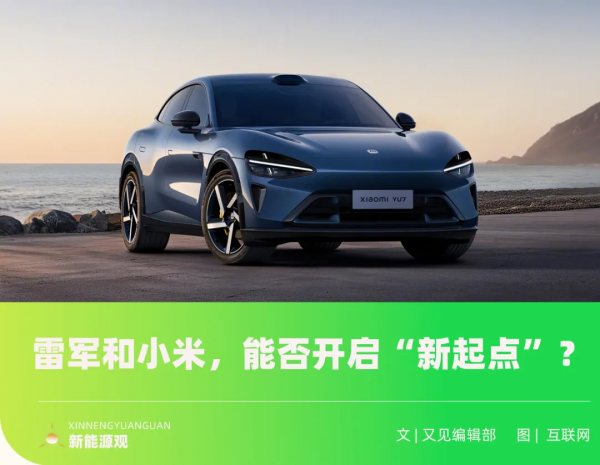
Original by New Energy View (ID: xinnengyuanqianzhan)
2848 words in full text, 9-minute read
Unsurprisingly, when Lei Jun made his grand return with a launch event spanning over two hours, major social media platforms like Weibo and Douyin were instantly flooded with topics related to "YU7" and "Lei Jun."
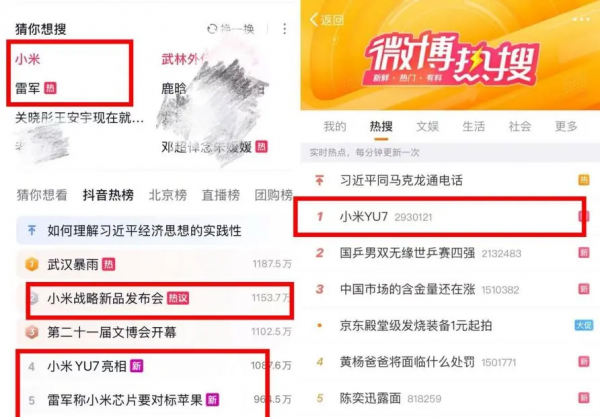
Image/Douyin Trending (left), Weibo Trending (right)
Source/Screenshot from New Energy View
On the evening of May 22, the "New Beginning" launch event arrived as scheduled. Lei Jun, the founder and CEO of Xiaomi Group, stepped onto the stage amidst thunderous applause from the live audience.
This "Xiaomi 15th Anniversary Strategic New Product Launch" was originally scheduled a month earlier but was postponed due to a series of crises and public opinion. Along with it, "social media expert" Lei Jun also maintained a conspicuous silence.
From the Tongling Xiaomi SU7 explosion incident on March 29, to the SU7 Ultra carbon fiber hood controversy, to the recent quality debates surrounding Xiaomi SU7... Over the past 50 days, Xiaomi Automobile and Lei Jun have faced their biggest crisis since Xiaomi's inception.
Consequently, this launch event titled "New Beginning" is perceived by outsiders as Xiaomi's "redemption campaign" – it not only unveils Xiaomi's second model, YU7, but also reflects Xiaomi's deep introspection amidst the public opinion storm.
1. 'Lei Jun Returns, But Not Fully'
The over two-hour launch event was bifurcated into two distinct parts.
In the first half, Lei Jun swiftly introduced Xiaomi's self-developed mobile SoC chip, "Xiaomi Xuanjie O1," alongside new products equipped with it, such as the "Xiaomi 15S Pro," "Xiaomi Pad 7 Ultra," Xiaomi Watch S4 eSIM, and multiple smart home appliances within the "people-car-home ecosystem," including the Mijia Air Conditioner Pro, Mijia Refrigerator Pro, and Mijia Dual-Zone Washer Pro.
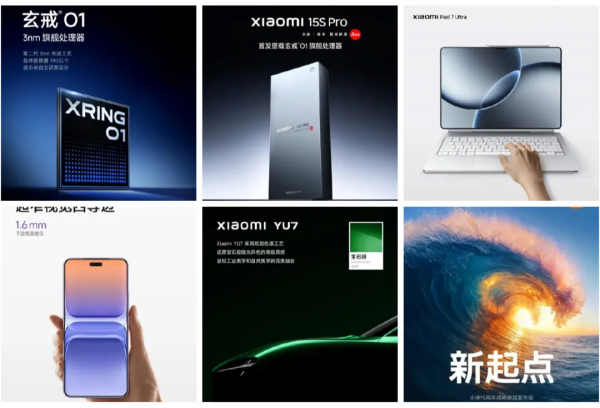
Image/Selected Products from Xiaomi Launch Event
Source/Screenshot from Weibo New Energy View
Although Lei Jun repeatedly emphasized that "Xiaomi has always harbored a chip dream" and revealed a decade-long commitment to chip research and development since September 2014, with a conservative investment exceeding 50 billion yuan, the duration of these introductions was still significantly shorter than that dedicated to Xiaomi Automobile's first SUV.
At 8:15 PM that night, Lei Jun donned a suit and officially commenced the second half of the event, focusing on Xiaomi YU7. After briefly announcing the achievement of "delivering over 258,000 Xiaomi SU7 series vehicles in 2025, with 28,000 vehicles delivered in April alone," the Xiaomi YU7, positioned as a luxury high-performance SUV, made its grand debut.
With dimensions of 4999/1996/1600mm and a wheelbase of 3000mm, it undoubtedly qualifies as a full-size SUV.
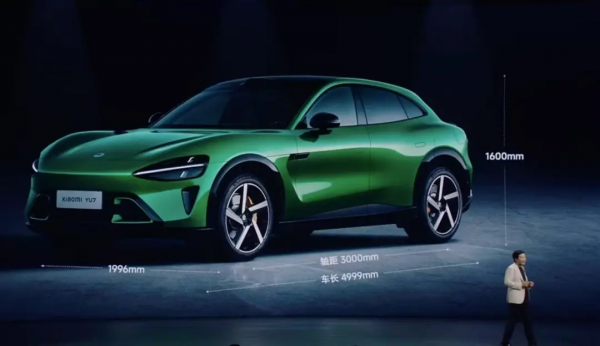
Image/Xiaomi Launch Event Livestream
Source/Screenshot from New Energy View
While the launch of YU7 occupied nearly half of the entire event, it was not a technical deep dive like the SU7 launch. Lei Jun introduced it primarily from consumer-centric aspects such as color options, endurance capacity, and safety.
For instance, he announced three color options: Jewel Green, Titanium Metal, and Lava Orange; the entire lineup is equipped with an 800V silicon carbide high-voltage platform and a large battery pack, with the standard version boasting an endurance of 835KM; and 2200MPa Xiaomi ultra-strong steel is used on the four-door anti-collision beams, effectively enhancing occupant protection in side collisions.
However, for topics that consumers are even more concerned about, such as Xiaomi's assisted driving and battery safety, Lei Jun barely mentioned them during the Xiaomi YU7 launch event, to the point where they could be easily overlooked.
Some industry insiders expressed "disappointment" towards Lei Jun, believing that he was deliberately avoiding these issues.
One on-site "Xiaomi fan" commented, "Before the launch event, some said it was a sign of Lei Jun's return, but I feel like he hasn't fully 'come back' – his overall state seemed uneasy and lacked his former relaxed demeanor, and he even looked at the teleprompter significantly more often."
2. A Major Test of Growth Amidst a Public Opinion Storm
It's not surprising that Lei Jun's state was not at its peak.
When he announced his determination to enter the automotive industry, with Xiaomi's internet mindset and extreme cost-effectiveness label, Xiaomi Automobile was born with a "top-tier" aura.
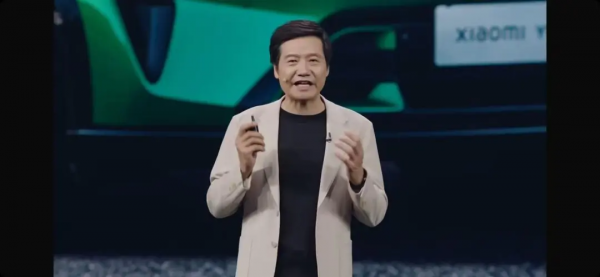
Image/Xiaomi Launch Event Livestream
Source/Screenshot from New Energy View
However, as the tide recedes, Xiaomi Automobile, which once enjoyed immense popularity, is now experiencing its first major challenge on the road to car manufacturing.
The SU7 explosion incident in early 2025 served as the trigger for the crisis, pushing the controversy over "new energy vehicle safety" to the forefront. Industry insiders pointed out: "In the new energy sector, safety is the lifeline that companies must uphold, and any controversy can trigger a chain reaction."
Shortly after, the "carbon fiber dual-airflow front hood" of the SU7 Ultra was accused of not matching its promotional claims with actual functions, and owners' test feedback reduced this design from an "industrial highlight" to a focal point of public opinion.
What was even more impactful was that Douyin successively featured details and defects captured by car owners: craftsmanship flaws such as warped front bumper fenders and uneven interior seams. Some consumers bluntly stated: "When it was on pre-sale, they touted it as a 'benchmark in details,' but now these flaws make me doubt whether the quality control is up to standard."
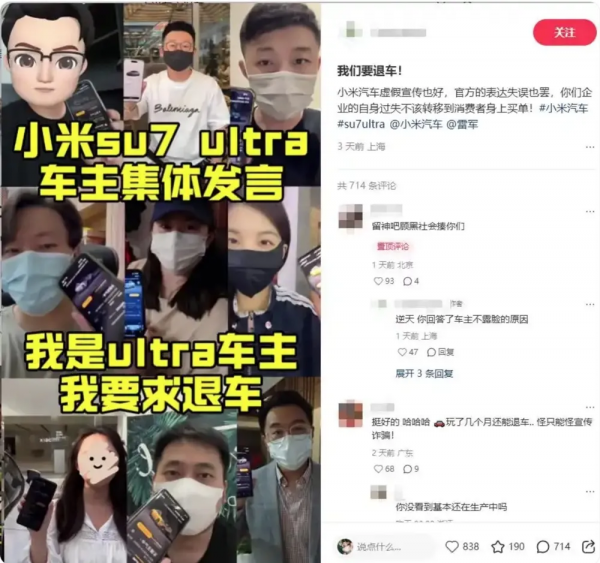
Image/Rights Protection by Xiaomi SU7 Ultra Owners
Source/Internet Screenshot from New Energy View
Faced with the crisis, Xiaomi Automobile responded promptly, stating "we will not avoid problems; user trust is our lifeline," but timely response is only the foundation of crisis management; the key lies in regaining trust through concrete actions.
This is not a simple task for any industry, and Xiaomi Automobile is no exception. An undeniable fact is that this controversy has tarnished Xiaomi Automobile's once-bright image.
One of the most intuitive manifestations is that Lei Jun, who was frequently active on various social media platforms, has drastically reduced the frequency of his public appearances and updates on his personal accounts.
Since attending the China Electric Vehicle Hundred People Forum at the end of March, Lei Jun's personal Douyin account has been stagnant for nearly two months, his Weibo interactions have dropped to a low in recent years, he has paused his social media fitness check-ins, and he even missed the Shanghai Auto Show.
Lei Jun once admitted that his emotions had been low for over a month, and he had canceled some meeting arrangements and business trips, as well as paused some of his social media interactions.
It was not until May 15 that Lei Jun finally responded in detail to the impact of a series of events in an internal speech after the Xiaomi Values Contest.
In his speech, he focused on reviewing the impact of the Xiaomi SU7 incident, stating that "after the incident, the management and automotive team held countless meetings to study how to systematically solve the problem, attaching great importance to automotive safety and quality to become the safest car."
At the same time, Lei Jun also summarized Xiaomi's development over the past five years, saying, "We have been subjected to torrential questions, criticisms, and accusations, and like my colleagues, I was completely at a loss." Previously, Lei Jun also mentioned when resuming his fitness check-ins on Weibo: "The past month has been the most difficult period since I founded Xiaomi..."
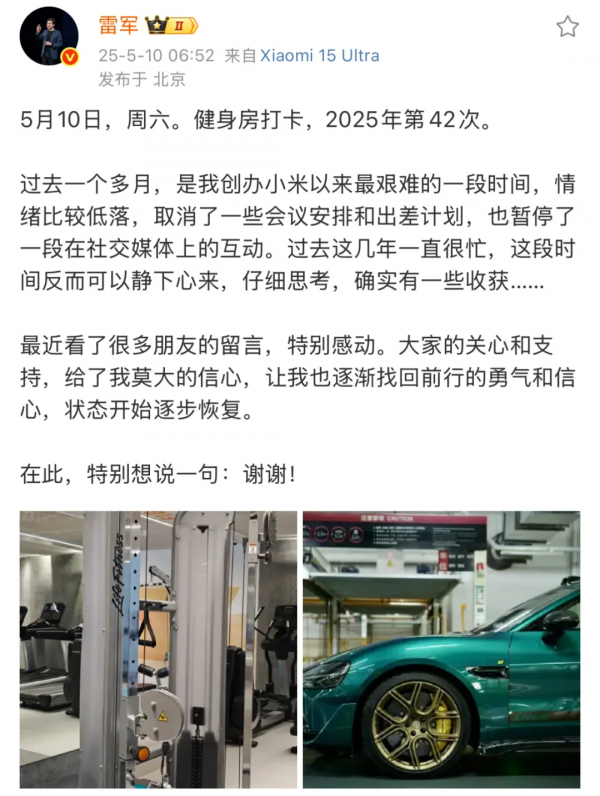
Image/Lei Jun's Weibo Post
Source/Weibo Screenshot from New Energy View
Some industry observers believe that "Lei Jun's reflection demonstrates an entrepreneur's sincerity, but how to transform this reflection into improvements in product power and quality control is what consumers truly care about."
3. Xiaomi's 'Redemption Campaign' Cannot Afford to Fail
Four years ago, when Lei Jun announced Xiaomi's entry into the automotive industry, he candidly stated, "Entering the smart auto industry is the most significant decision in Xiaomi's history and the last major entrepreneurial project of my life. I am willing to bet my entire reputation and effort on it."
Last March, when the Xiaomi SU7 was officially launched, Lei Jun expressed his excitement and nervousness, likening it to a major life exam, and repeatedly emphasized, "Building cars is tough, but success will definitely be cool."
In the following year, Xiaomi Automobile and Lei Jun indeed received unprecedented attention that rivals found hard to match.
However, the higher one stands, the harder the fall.
'We have always considered ourselves newcomers in the automotive industry, a startup company. But today, Xiaomi's scale, influence, and social attention have reached very high levels, and society and the public require us to assume the responsibility of a true industry leader of a major company. We deeply realize that this is an unavoidable responsibility for 15-year-old Xiaomi.'"
In his May 15 speech, Lei Jun mentioned that the 15-year-old Xiaomi no longer has a "novice protection period" and must hold itself to higher standards.
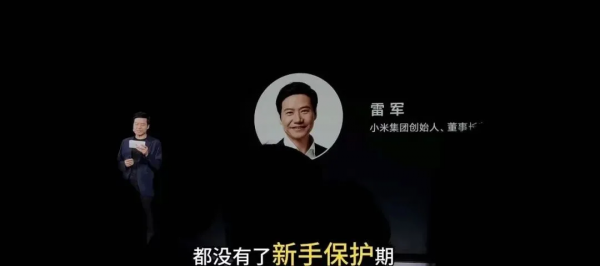
Image/Xiaomi Internal Speech
Source/Internet Screenshot from New Energy View
Indeed, Xiaomi Automobile is no longer a "newcomer" in today's fiercely competitive market, and it needs to re-examine its positioning. This may also be one of the reasons why the debut of YU7 was far less high-profile than that of SU7.
In 2025, Xiaomi Automobile's annual sales target is 350,000 vehicles. Relying on the SU7 and YU7 models, as well as a robust sales network and fan economy, achieving this target is not difficult. However, for Lei Jun and Xiaomi, the goal of pledging their reputation to become one of the "top five automakers globally" is becoming increasingly arduous – rebuilding consumer trust is the foundation of everything.
After experiencing the public opinion storm, Lei Jun and Xiaomi Automobile may have more clearly recognized that there is no room for luck in the automotive market, and pragmatism is the key to breaking the deadlock.
In fact, Lei Jun has already made changes in intelligent driving, such as equipping the entire Xiaomi YU7 lineup with a lidar with a detection distance of 200 meters.
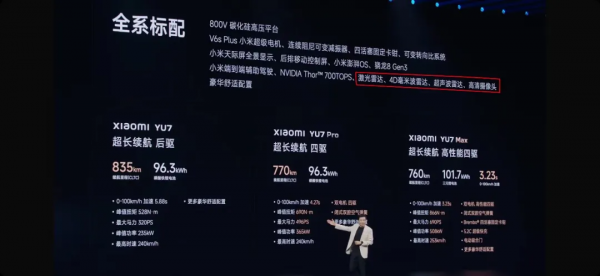
Image/Product List of Xiaomi YU7 Standard Equipment
Source/Internet Screenshot from New Energy View
Regarding other issues that arose with the Xiaomi SU7, standard equipment should also be upgraded to the top-of-the-line specifications of competitors. For example, regarding battery safety hazards, a special investigation should be immediately initiated, third-party institutions should be introduced to conduct full-condition thermal management tests, a user battery health management system should be established, and free battery upgrades should be provided for vehicles with hidden dangers.
For false or exaggerated promotions, a cross-departmental review team should be formed to strictly examine key information such as product endurance and parameters to ensure that promotional content is true and transparent, and misleading statements are eliminated.
Quality control should be the top priority. Establishing a special team and a transparent recall mechanism is urgent. Free repairs for faulty vehicles, developing self-check functions with OTA technology, and regularly publishing quality improvement progress can all better reduce quality complaints.
By rebuilding trust through practical rectifications, Xiaomi Automobile can regain consumer trust and move closer to its goal of "becoming one of the top five in the world within ten years."

